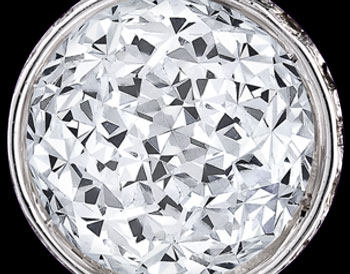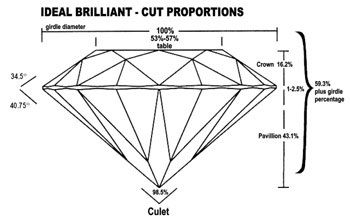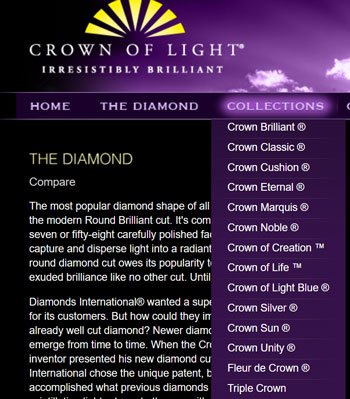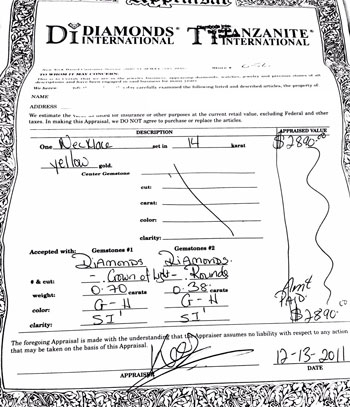Crown of Light ® — how special is it?
 Vacationers often return home with new jewelry, purchases they regard as beautiful treasures that were also great bargains. If they've just been on a cruise, the jewelry will likely sport a Crown of Light® diamond, a "unique" diamond, a "patented" diamond, that "maximizes the diamond's highest potential."
Vacationers often return home with new jewelry, purchases they regard as beautiful treasures that were also great bargains. If they've just been on a cruise, the jewelry will likely sport a Crown of Light® diamond, a "unique" diamond, a "patented" diamond, that "maximizes the diamond's highest potential."
How should the agent and insurer regard this diamond? Is it something special?
Branding the cut
Crown of Light is a brand name for a diamond cut with 90 facets. This 90-facet cut is promoted as an improvement over the popular round brilliant cut, with its 57 or 58 facets. The seller, Diamonds International®, says the Crown of Light cut results in "a spectacular diamond that disperses more light in more directions…with more fire than diamonds have ever achieved."
 That is, of course, advertising hype. More facets do not equal more fire or scintillation.
That is, of course, advertising hype. More facets do not equal more fire or scintillation.
The sparkle of a diamond comes from the geometry of the stone. Physics and optics have shown that a round brilliant diamond displays the most sparkle when cut to the proportions shown in this diagram, and this has been recognized by gemologists for some time.
For insurers, it's always worth looking closely at brand names. As we've discussed in Is that Brand Name a cut above the others?, a brand is not necessarily an indication of quality.
Patent?
Crown of Light's advertising makes much of it being a "patented diamond," available only from Diamonds International (DI). US patent regulations require that a patented article must be marked as patented and carry the patent number. Is each Crown of Light diamond so marked? We have not been able to examine a loose Crown of Light to check.
Requests to DI for the patent number have gotten no response. So we do not know for certain that it is patented, in what country the patent is registered, or if a patent is still in effect.
For insurers, this is a significant issue. If patented, a Crown of Light (COL) diamond would have to be replaced by one from DI—which is, of course, what the seller would like. But if there is no active patent, or if the stone is not marked with the patent number, a stone of like kind and quality could be cut elsewhere, probably for considerably less than the price DI would charge the insurer.
 Note that a Trademark is not a Patent. The ® after the name Crown of Light looks very official, but it only means the phrase Crown of Light is a registered trademark, just as Diamonds International is a registered trademark. In fact, DI has trademarked more than a dozen "Crown" names.
Note that a Trademark is not a Patent. The ® after the name Crown of Light looks very official, but it only means the phrase Crown of Light is a registered trademark, just as Diamonds International is a registered trademark. In fact, DI has trademarked more than a dozen "Crown" names.
A trademark only prohibits others from using that name, but doesn't prohibit others from making a similar product or supplying a similar service.
Appraisals & Valuation
It's always a good idea for insurers to know where the jewelry was purchased. Jewelry bought on vacation should cause insurers to be extra alert about appraisals and valuations. Sellers in tourist areas know that vacationers often buy on impulse without understanding product quality or comparing prices.
Crown of Light is a case in point. These gems are sold exclusively by Diamonds International, which has at least 125 outlets primarily along the cruise line circuit. As discussed in last month's issue on Cruise Jewelry, sellers along these routes benefit from a steady flow of tourists heavily influenced by "shopping guides" who, for a commission, direct the travelers to certain retailers. Diamonds International becomes a name passengers recognize because they see it in every port and it is recommended by shopping guides.
Customers go away happy with their purchases but they may not remain so. On Internet sites, a number of Crown of Light buyers report inflated prices and appraisals. One consumer found her COL pendant purchased abroad for $3200 to be appraised at home for $950. Another bought a COL ring valued by the seller at $5400 but appraised at home for $2800; her appraiser said the color and clarity were not as specified on the store's appraisal.
One gemologist went so far as to describe the Crown of Light diamond as being cut like a miniature golf ball. Lots more facets, heavier carat weight, but less beauty than a well-cut diamond.
However, beauty is in the eye of the beholder. Any article under patent can be priced at whatever the seller decides, and if the buyer is willing to pay the stated price, a sale is made.
One customer was told by her appraiser that he didn't think the COL jewelry was worth the price paid because that same amount of money spent on a round brilliant cut would have bought a much higher-quality and more attractive ring. However, this appraiser said he could not value it lower because it was (presumably) a patented cut, available from only one source (DI).
Trust us
Crown of Light, for its part, holds that because its diamonds are so unique it offers "training" for jewelry appraisers on how to appraise COL diamonds. One appraisal site in the COL fold says, "Unless they are a qualified COL appraiser they will not have the information or experience to grade the cut. GIA cut grading standards cannot be used for grading the COL diamond. This will significantly undervalue the diamond."
This is a "just trust us" position! It requires the customer to accept the seller's standards for quality, rather than the standards set by the internationally respected grading system of the Gemological Institute of America. It also requires the customer to accept the seller's estimation of value, since only COL-trained appraisers are qualified to recognize COL's value.
Conclusion
Insurers should seriously consider whether they are willing to insure a piece of jewelry that can be replaced only from the seller—a seller widely accused of inflated qualities and valuations.
FOR AGENTS & UNDERWRITERS
If you do decide to insure a Crown of Light diamond, or any jewelry purchased on vacation, be aware that you will probably have an inflated appraisal—inflated in both qualities and valuation. Sellers in tourist locations know that the buyer will leave the country and have little recourse if there is a problem.
Be sure to get a sales receipt, as the selling price will surely be lower than the "list price" from Diamonds International.
Brands and trademarks are not necessarily indications of quality but they can often provide useful information. If there are brand names or any other terms on an appraisal that you don't understand, it may be worthwhile to consult a Jewelry Insurance Agent working on your behalf.
FOR ADJUSTERS
Do not assume that a brand name automatically justifies a high price, since poorly cut diamonds often masquerade as "branded" diamonds. See Is that Brand Name a cut above the others?
If the appraisal is inadequate, brand name information may prove useful, since some companies and sellers are known for their quality. An insurer's expert working on your behalf can help supply more information about valuation.
Although Crown of Light claims to be patented, we have not been able to verify this. If you are faced with a COL claim, do everything possible to verify the patent before going to DI for a replacement.
©2000-2025, JCRS Inland Marine Solutions, Inc. All Rights Reserved. www.jcrs.com


